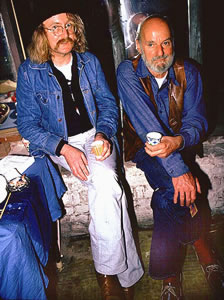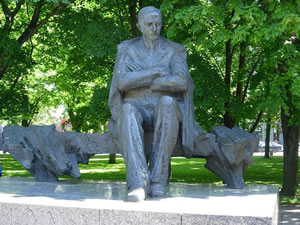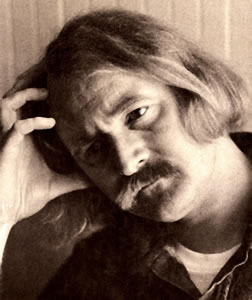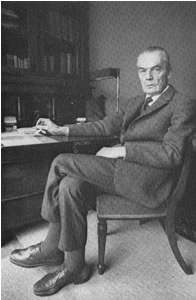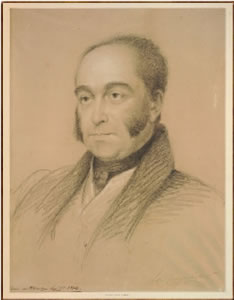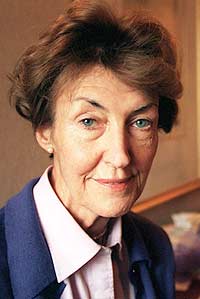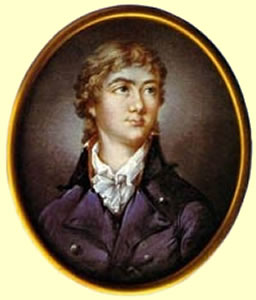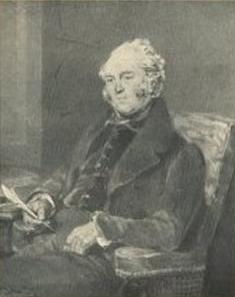De Nederlandse schrijver Tijs Goldschmidt werd geboren op 30 januari 1953 in Amsterdam. Daar groeide hij ook op, ging er naar het gymnasium en startte hij zijn studie biologie. Tijdens zijn studie verruilde hij de Amsterdamse Universiteit voor die van Leiden, om opgeleid te worden door leerlingen van de Nobelprijswinnaar Niko Tinbergen. Goldschmidt slaagde zowel voor zijn kandidaats- als voor zijn doctoraalexamen cum laude. Na zijn studie verbleef evolutiebioloog Goldschmidt vijf jaar in Tanzania om in het Victoriameer “furu” te bestuderen. “Furu” zijn kleine baarsachtige vissen, cichliden, die razendsnel opsplitsen in nieuwe soorten en daardoor de droom zijn van elke darwinist. Hij schreef hier een dissertatie over en publiceerde vele artikelen in nationale en internationale tijdschriften. In 1993 gaf Tijs Goldschmidt zijn baan als bioloog aan de Universiteit van Leiden op om zich op het schrijven te gaan richten. In 1994 kreeg hij als schrijver nationale bekendheid met zijn boek “Darwins Hofvijver”, een spannend ooggetuigenverslag van zijn onderzoekstijd aan het Victoriameer. Het boek werd in 1995 genomineerd voor de AKO-Literatuurprijs en kreeg in datzelfde jaar de Kijk/Wetenschapsprijs. Ook in het buitenland was het boek een groot succes. In 2000 verscheen de essaybundel “Oversprongen”, een koppeling tussen kunst en wetenschap met persoonlijke, vaak tegendraadse observaties. In 2001 ontving Goldschmidt voor “Oversprongen” de Jan Hanlo Essayprijs. Er verschenen meerdere artikelen van zijn hand over kunst. In 2003 hield hij de eerste Stephen Gould lezing met als titel “De andere linkerkant/ Links en rechts in de evolutie”.
Uit: Een olifant in de Schwebebahn (2000)
”In de trein was het zo druk dat ik aan lezen niet toekwam. Ik las dezelfde zin ten minste zeven maal: ‘… Schlemmers triadisch ballet is eigenlijk een anti-dans, een constructivisme van de dans, zoals alleen door een schilder en beeldhouwer bedacht kon worden. Immers niet meer het menselijk lichaam en zijn bewegingen waren uitgangspunt en dragende kracht van expressie, maar bepaalde figuurlijke vindingen …’ Ik had me voorgenomen het Bauhausboek waaruit deze zin afkomstig was uit te lezen, maar daarvan kwam niets terecht. Kaartjes laten zien, koffie. Een buurman die opstond, wegliep en terugkwam, opstond, wegliep en weer terugkwam. Tevergeefs op zoek naar een rustiger coupé. Boek weer opengeslagen: ‘zoals alleen door een schilder en beeldhouwer bedacht kon worden …’ Toen zei mijn reisgenoot O. zich op te winden over jagers. Vlak buiten de grens van een natuurgebiedje in de Betuwe waar hij vaak wandelde, lagen ze met het geweer in de aanslag in het gras te wachten. Zodra een wintertaling of smient het in zijn hoofd haalde om een meter in onbeschermde lucht te vliegen, werd hij neergeknald. Ik overwoog ook iets weerzinwekkends te vertellen, maar besloot alleen instemmend te knikken en begon weer aan die zin. Düsseldorf. We moesten overstappen op de S-Bahn naar Wuppertal, want daar woonde Heinz Rasch, die we zouden bezoeken. Rasch, nu in de negentig, was architect en stoelenontwerper geweest. Hij werkte ooit als assistent van Mies van der Rohe. Vlakbij het station Wuppertal wees O. uit het raam en zei: ‘Kijk, de Schwebebahn. Dat is leuk. Daar heeft Mart Stam al een idee voor gehad. Ze hebben er voor de grap ooit een olifant mee vervoerd, maar die is in de rivier beland.’ Door de lucht sneed, hangend aan kabels, een trammetje, dat afboog boven een rivierdal.”

Tijs Goldschmidt (Amsterdam, 30 januari 1953)
De Amerikaanse schrijver Richard Brautigan werd geboren op 30 januari 1935 in Tacoma, Washinton. Hij wordt beschouwd als de belangrijkste vertegenwoordiger van de Underground scene van de Amerikaanse westkust uit de jaren 60 en 70. Brautigans geboorte viel midden in de grote depressie en zijn jeugd is dan ook door armoede getekend. Aan het eind van de jaren 50 kwam hij met literaire kringen in San Francisco in contact. Met zijn romans en dichtbundels werd hij gedurende de late jaren 60 een beetje een icoon van de hippie-generatie. In 1967 was hij “Poet in Residence” aan het California Institute of Technology. In de jaren 70 lukte het hem niet goed aansluiting te vinden bij zijn vroegere successen, iets wat bij hem leidde tot verbittering. Hij leefde steeds meer teruggetrokken en raakte verslaafd aan alcohol. In september 1984 pleegde hij zelfmoord. Gevonden werd hij echter pas op 25 oktober.
Uit: Revenge of the Lawn
A need for gardens
“When I got there they were burying the lion in the back yard again. As usual, it was a hastily dug grave, not really large enough to hold the lion and dug with a maximum of incompetence and they were trying to stuff the lion into a sloppy little hole.
The lion as usual took it quite stoically. Having been buried at least fifty times during the last two years, the lion had gotten used to being buried in the back yard.
I remember the first time they buried him. He didnt know what was happening. He was a younger lion, then, and was frightened and confused, but now he knew what was happening because he was an older lion and had been buried so many times.
He looked vaguely bored as they folded his front paws across his chest and started throwing dirt in his face.
It was basically hopeless. The lion would never fit the hole. It had never fit a hole in the back yard before and it never would. They just couldnt dig a hone big enough to bury that lion in.
“Hello,” I said. “The holes too small.”
“Hello,” they said, “No, it isnt.”
This had been our standard greeting now for two years.
I stood there and watched them for an hour or so struggling desperately to bury the lion, but they were only able to bury of him before they gave up in disgust and stood around trying to blame each other for not making the hole big enough.
“Why dont you put a garden in next year? I said. ”This soil looks like it might grow some good carrots.“
They didnt think that was very funny.”

Richard Brautigan 30 januari 1935 – september 1984)
De Australische schrijfster Shirley Hazzard werd geboren op 30 januari 1931 in Sydney, maar het grootste deel van haar leven heeft zij verdeeld tussen New York City en Capri, Italië. In 1963 trouwde zij met Francis Steegmuller; hij overleed in 1994. Hazzard schreef de romans The Evening of the Holiday (1966), The Bay of Noon (1970), The Transit of Venus (1981), en The Great Fire (2003), novellen die verzameld zijn in Cliffs of Fall and Other Stories (1963), en People in Glass Houses (1967), de verhandelingen Defeat of an Ideal (1973) en Countenance of Truth (1990) en de biografie Greene On Capri (2000), over de schrijver Graham Greene. De werken van Hazzard hebben diverse prijzen behaald. The Transit of Venus werd onderscheiden met de National Book Critics’ Circle Award. The Great Fire, haar eerste roman na meer dan twintig jaar, kreeg de American Book Award, de National Book Award en de Miles Franklin Award
Uit: The Great Fire (2003)
“Now they were starting. Finality ran through the train, an exhalation. There were thuds, hoots, whistles, and the shrieks of late arrivals. From a megaphone announcements were incomprehensible in American and Japanese. Before the train had moved at all, the platform faces receded into the expression of those who remain.
Aldred Leith sat by a window, his body submissively chugging as they got under way. He would presently see that rain continued to fall on the charred suburbs of Tokyo, raising, even within the train, a spectral odour of cinders. Meanwhile, he was examining a photograph of his father. Leith was holding a book in his right hand – not reading, but looking at a likeness of his father on the back cover.
It was one of those pictures, the author at his desk. In an enactment of momentary interruption, the man was half-turned to the camera, left elbow on blotter, right hand splayed over knee. Features fine and lined, light eyes, one eyelid drooping. A taut mouth. Forehead full, full crop of longish white hair. The torso broad but spare; the clothes unaffected, old and good. As a boy, Leith had wondered how his father could always have good clothes so seldom renewed – a seeming impossibility, like having a perpetual two days’ growth of beard.”
Shirley Hazzard (Sydney, 30 januari 1931)
De Duitse schrijver Hans Erich Nossack werd op 30 januari 1901 geboren in Hamburg. Na het gymnasium studeerde hij aanvankelijk kunstgeschiedenis en literatuurwetenschap in zijn geboortestad. In 1920 ging hij naar Jena om rechten en economie te studeren. In 1923 keerde hij naar Hamburg terug, trouwde er in 1925 en volgde een opleiding als bankkoopman. Daarnaast schreef hij gedichten en toneelstukken, maar tot publicatie kwam het niet. In 1930 werd hij lid van de KPD en werkte hij in het verzet tegen de nazi’s. In 1933 kwam het tot huisdoorzoekingen door de SA en de politie. Nossack ging in de firma van zijn vader werken en nam kort daarna de leiding ervan over. In 1943 werden zijn dagboeken en manuscripten door het bombardement op Hamburg vernietigd. Hij begon met publiceren in 1947. Vertalingen van zijn eerste boeken verschenen al snel in Frankrijk. In zijn prozatekst Der Untergang beschrijft hij als eerste Duitse schrijver de verschrikkingen van de bommenoorlog aan de hand van de verwoesting van Hamburg. In 1955 verscheen zijn wellicht succesvolste roman Spätestens im November.
Uit: Der Untergang
„Man wagte nicht, Luft zu holen, um es nicht einzuatmen. Es war das Geräusch von achtzehnhundert Flugzeugen, die in unvorstellbaren Höhen von Süden her Hamburg anflogen. Wir hatten schon zweihundert oder auch mehr Angriffe erlebt, darunter sehr schwere, aber dies war etwas völlig Neues. Und doch wußte man gleich: es war das, worauf jeder gewartet hatte, das wie ein Schatten seit Monaten über all unserm Tun lag und uns müde machte, es war das Ende. Dies Geräusch sollte anderthalb Stunden anhalten, und dann in drei Nächten der kommenden Woche noch einmal. Gleichmäßig hielt es sich in der Luft. Gleichmäßig hörte man es auch dann, wenn sich das viel lautere Getöse der Abwehr zum Trommelfeuer steigerte. Nur manchmal, wenn einzelne Staffeln zum Tiefangriff ansetzten, schwoll es an und streifte mit seinen Flügeln den Boden. Und doch war dies furchtbare Geräusch wieder so durchlässig, daß auch jeder andere Laut zu hören war: nicht nur die Abschüsse der Flak, das Krepieren der Granaten, das heulende Rauschen der abgeworfenen Bomben, das Singen der Flaksplitter, nein, sogar ein ganz leises Rascheln, nicht lauter als ein dürres Blatt, das von Ast zu Ast fällt, und wofür es im Dunkeln keine Erklärung gab.
Das Geräusch trieb mich sofort zurück. Ich weiß nicht mehr, ob Misi mich etwas fragte und welche Antwort ich gab. Es ist möglich, daß wir uns von oben nach unten etwas zuriefen, aber es werden nicht viele Worte gewesen sein; denn dies Geräusch machte alles Reden zur Lüge und drückte Worte wehrlos nieder.“

Hans Erich Nossack (30 januari 1901 – 2 november 1977)
Anton Hansen Tammsaare werd geboren als Anton Hansen op 30 januari 1878 in Albu. Zijn vijfdelige romancyclus Tõde ja õigus (Waarheid en Gerechtigheid, 1926 – 1933) geldt als een van de wezenlijke werken van de Estlandse literatuur. Hoewel Tammsaare zijn thema’s uit de geschiedenis en uit het leven van het volk van Estland koos hebben zijn romans de invloed ondergaan van mensen als Henri Bergson, Carl Gustav Jung en Sigmund Freund en van schrijvers als Knut Hamsun en André Gide. Tammsaare was lid van de kunstenaarsgroep Noor-Eesti (Jong-Estland) die tegen de culturele dominantie van Rusland gericht was.
Uit: Miniatures
“… The very first spring, when the prison was built, a nightingale began to sing in an alder-tree in front of the prison-house.
This was at once reported to the King by his faithful henchmen.
“What is the burden of the song?” the King asked.
“Love and freedom, Your Majesty,” answered the henchmen, bowing to the ground.
For a moment the wise King was deep in thought. They they heard him say:
“Life is captivity, and it would be wrong to sing of freedom. Life is vengeance, and it would be a crime to glorify love. I, your king, do not know what freedom is, for I am a slave of slaves. I, your master, do not know what love is, for I have only obligations. Therefore, take my fiercest falcon and set it on the nightingale.”
Anton Hansen Tammsaare (30 januari 1878 – 1 maart 1940)
Adelbert von Chamisso heette eigenlijk Louis Charles Adélaïde de Chamisso de Boncourt. Hij werd op het slot Boncourt in de Champagne geboren op 30 januari 1781, maar zijn adellijke familie moest in 1794 voor de Franse Revolutie op de vlucht. Chamisso werd page van Frederika Louise van Pruisen. Hij leerde in een snel tempo Duits en schreef er verschillende vertellingen en sprookjes in. In Berlijn kwam hij in contact met onder anderen Kleist, Motte-Fouqué, Eichendorff, Hoffmann en Brentano. Chamisso diende als officier in het Pruisische leger van 1798 tot 1807, en werd lid van de Nordsternbund, een verzameling gelijkgestemde dichters. Chamisso keerde na zijn legerdienst nog naar Frankrijk terug en bezocht ook Zwitserland, maar kreeg een afkeer van Napoleon. Hij legde zich toe op de plantkunde en besloot in 1815 op expeditie te gaan. In 1814 publiceerde hij Peter Schlemihls wundersame Geschichte; het is een enigszins autobiografische kruising tussen een sprookje en een novelle, vol magische wendingen, dat in alle belangrijke talen uit die tijd vertaald werd en Chamisso wereldberoemd maakte. Aangezien Chamisso een van de succesrijkste niet-oorspronkelijk Duitstalige auteurs was, is in 1985 een prijs naar hem vernoemd: de Adelbert-von-Chamisso-Preis, die aan schrijvers wordt uitgereikt wier moedertaal niet het Duits is en die een lovenswaardig Duits werk hebben geschreven.
Traum der eignen Tage
Traum der eignen Tage,
Die nun ferne sind.
Tochter meiner Tochter,
Du mein süßes Kind,
Nimm, bevor die Müde
Deckt das Leichentuch,
Nimm ins frische Leben
Meinen Segensspruch.
Siehst mich grau von Haaren,
Abgezehrt und bleich,
Bin, wie du, gewesen
Jung und wonnereich,
Liebte, so wie du liebst,
Ward, wie du, auch Braut,
Und auch du wirst altern,
So wie ich ergraut.
Laß die Zeit im Fluge
Wandeln fort und fort,
Nur beständig wahre
Deines Busens Hort;
Hab ich’s einst gesprochen,
Nehm ich’s nicht zurück:
Glück ist nur die Liebe,
Liebe nur ist Glück.
Als ich, den ich liebte,
In das grab gelegt,
Hab ich meine Liebe
True in mir gehegt:
War mein Herz gebrochen,
Blieb mir fest der Mut,
Und des Alters Asche
Wahrt die heilge Glut.
Nimm, bevor die Müde
Deckt das Leichentuch,
Nimm ins frische Leben
Meinen Segensspruch:
Muß das Herz dir brechen,
Bleibe fest dein Mut,
Sei der Schmerz der Liebe
Dann dein höchstes Gut.
Adelbert von Chamisso (30 januari 1781 – 21 augustus 1838)
De Engelse schrijver Walter Savage Landor werd geboren op 30 januari 1775 in Ipsley Court, Warwickshire. Hij begon met schrijven al tijdens zijn studiejaren in Oxford. Zijn werk bestond uit zowel klassieke epigrammen als gedichten en toneelstukken. Beroemd werd hij echter in het bijzonder wegens zijn geslepen proza. Nietzsche zag in hem een van de vier „meesters van het proza“ in de 19e eeuw. Vanaf 1814 bracht hij een groot deel van zijn leven door op het Europese vasteland. In de jaren 1824 – 1829 ontstonden er zijn Imaginary conversations, die als zijn hoofdwerk beschouwd kunnen worden.
Uit: Imaginary conversations
Henry VIII. and Anne Boleyn
“Henry. Dost thou know me, Nanny, in this yeoman’s dress? ‘S blood! does it require so long and vacant a stare to recollect a husband after a week or two? No tragedy-tricks with me! a scream, a sob, or thy kerchief a trifle the wetter, were enough. Why, verily the little fool faints in earnest. These whey faces, like their kinsfolk the ghosts, give us no warning. (Sprinkling water over her) Hast had water enough upon thee? take that then . . . art thyself again?
Anne. Father of mercies! do I meet again my husband, as was my last prayer on earth! do I behold my beloved lord . . . in peace . . . and pardoned, my partner in eternal bliss! It was his voice. I can not see him . . . why can not I? O why do these pangs interrupt the transports of the blessed!
Henry. Thou openest thy arms: faith! I came for that: Nanny, thou art a sweet slut: thou groanest, wench: art in labour? Faith! among the mistakes of the night, I am ready to think almost that thou hast been drinking, and that I have not.
Anne. God preserve your highness: grant me your forgiveness for one slight offence. My eyes were heavy; I fell asleep while I was reading; I did not know of your presence at first, and when I did I could not speak. I strove for utterance; I wanted no respect for my liege and husband.
Henry. My pretty warm nestling, thou wilt then lie! Thou wert reading and aloud too, with thy saintly cup of water by thee, and . . . what! thou art still girlishly fond of those dried cherries!”
Late Leaves
THE leaves are falling; so am I;
The few late flowers have moisture in the eye;
So have I too.
Scarcely on any bough is heard
Joyous, or even unjoyous, bird
The whole wood through.
Winter may come: he brings but nigher
His circle (yearly narrowing) to the fire
Where old friends meet.
Let him; now heaven is overcast,
And spring and summer both are past,
And all things sweet.
Walter Savage Landor (30 januari 1775 – 17 september 1864)




